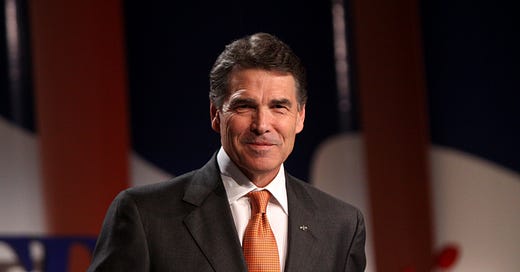
Back in late summer of 2011, when Rick Perry was running for president, the (then) Texas governor's message to voters was somewhat of a unique one:
"I'll work every day to try to make Washington, DC as inconsequential in your life as I can."
Small-government conservatives understood and shared his sentiment. The notion of centralized power being peeled away from the top-heavy federal government (an entity that most Americans don't trust), and dropped down to local governments (and in some cases, the private sector), was an appealing one. The belief, of course, is that with fewer hurdles and restrictions standing in the way of individual freedom, the pursuits of happiness and the American Dream can be more easily achieved.
Liberals didn't get it. Some believed Perry was vowing to abdicate presidential leadership, and undermine the responsibilities of elected representatives on Capitol Hill. MSNBC's Chris Matthews even framed Perry's words as a call for anarchy.
Writing for The Politico, Jeff Greenfield put forth the argument that Americans have never embraced the idea that the government should be inconsequential in their lives. He described how U.S. citizens have historically wanted and/or needed federal intervention, whether it be in regard to education, voting rights, the welfare state, etc.
Of course, Perry's statement wasn't that the federal government had no role to play in Americans' lives. He just wanted to reduce that role, pushing the power closer to the people. Greenfield was right in that much of the country expects government benefits and aid, and these people have only grown in numbers over the years. Perhaps the most glaring evidence we've seen of this was the 2016 election, where both of major-party presidential nominees campaigned against entitlement-reform, and for government-heavy healthcare.
Still, it would have been interesting to see how Perry's theme would have played with the general electorate, had a series of gaffes and political misfires not sunken his primary hopes. He used the slogan again when he ran for president the second time, but with Candidate Trump soaking up all of the media's attention (from a ridiculously bloated GOP field), and uncharitable memories from four years earlier, his candidacy didn't get very far.
Perry likely won't ever run again, but our current political climate is further illustrating the wisdom of his doctrine with each passing day.
Take the issue of healthcare, for example. We learned early in the Obama presidency that a political party with enough power in DC can go against the will of a strong majority of voters, and — in one fell swoop — completely screw up a significant portion of the U.S. economy.
Prior to the passage of Obamacare, national polls showed that roughly 20% of Americans were unhappy with their healthcare situations. Rather than focusing on the concerns of this relatively small percentage of individuals, the Democrats turned the nation's entire insurance system on its head, selling (and signing into law) fatally-flawed legislation on a plethora of false premises and promises. The Affordable Care Act has left us with skyrocketing premiums and deductibles, fewer healthcare choices, and another insolvent entitlement.
The looming catastrophe, and promises of "repeal and replace," led to Republicans picking up significant seats in DC. And now that the GOP finally holds the presidency, one would think that the party would be in a great position to start righting the healthcare ship.
Only, that's not what's happening.
Republican lawmakers, despite repeated efforts, can't reach enough of an internal consensus to move forward on any kind of reform bill. And with a deeply distrusted (and increasingly unpopular) Republican president sitting in the Oval Office, anything with his name attached to it has become politically poisonous. In fact, President Trump's election-win managed to do the unthinkable by pulling Obamacare's approval rating above water (for the first time in its existence).
Additionally, the political demagoguery from the Democratic party has again reached levels of pure insanity, with U.S. senators (most notably Elizabeth Warren and Bernie Sanders) publicly claiming that even modest changes to the current system will result in mass deaths. The rhetoric may be reckless and utterly dishonest, but it has also been effective.
I live in Colorado, where the effects of Obamacare have hit us particularly hard. The individual health-insurance market has been devastated. Major exchanges have collapsed. My family lost our affordable plan early on, and soon after, I lost my doctor. I have friends who are paying more for their monthly health insurance premiums than they are for their home mortgages. And I assure you, none of us are amused by the perpetual clown-show in Washington that creates and maintains these obstacles.
It all begs a few simple questions: Why do a handful of elected leaders, who don't even represent our state, get to make such consequential healthcare decisions on our behalf? Why should a U.S. president's popularity or unpopularity matter at all, when it comes to the healthcare coverage of a private citizen? Why on earth is Washington DC this consequential in our lives?
To find the answers, we unfortunately have to look at ourselves. We keep electing populist personalities who promise us the world, rather than individualist leaders who are humble enough to believe that communities should have a significant say in what's best for them. The more problems we entrust high-ranking political salespeople to deal with, the less likely they are to be solved. And because too few of us understand that, we've put ourselves in a position where we have to endure the endless posturing and drama that plays out every day in DC, while hoping something constructive will eventually come from it.
Unfortunately, that's rarely the case. But we'll keep getting behind such leaders, and we'll continue to be let down, because we've made Washington far too consequential in our lives. Sadly, at this point in our history, the alternative feels like little more than a daydream.












